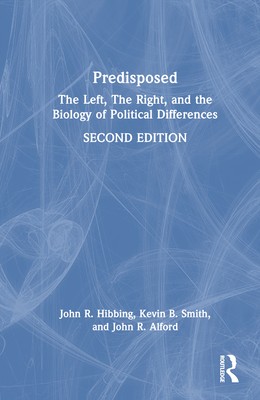
- We will send in 10–14 business days.
- Author: John R Hibbing
- Publisher: Routledge
- ISBN-10: 1032524960
- ISBN-13: 9781032524962
- Format: 15.2 x 22.9 x 1.8 cm, hardcover
- Language: English
- SAVE -10% with code: EXTRA
Reviews
Description
This thoughtfully-updated revision of a classic text sheds new light on the potential sociological and biological differences that result in deep, seemingly unbridgeable political divisions.
Renowned social scientists and experts in biopolitics, John Hibbing, Kevin Smith, and John Alford present overwhelming evidence that political opinion is shaped not just due to cultural background or information bias, but is rather the result of diverse psychological, physiological, and genetic traits. This new edition shifts the emphasis from differences between the political left and the right (liberals and conservatives) as they have traditionally been understood and explores the specific new brands of "liberalism" and "conservatism" in the modern era. The book also seeks to analyze the impact of negativity biases and more-focused sensitivity have on political insiders and outsiders alike.
An essential read for students and scholars of political psychology and party politics, this book invites the reader to reconsider their perspectives on public opinion and partisan conflict.
EXTRA 10 % discount with code: EXTRA
The promotion ends in 17d.17:16:52
The discount code is valid when purchasing from 10 €. Discounts do not stack.
- Author: John R Hibbing
- Publisher: Routledge
- ISBN-10: 1032524960
- ISBN-13: 9781032524962
- Format: 15.2 x 22.9 x 1.8 cm, hardcover
- Language: English English
This thoughtfully-updated revision of a classic text sheds new light on the potential sociological and biological differences that result in deep, seemingly unbridgeable political divisions.
Renowned social scientists and experts in biopolitics, John Hibbing, Kevin Smith, and John Alford present overwhelming evidence that political opinion is shaped not just due to cultural background or information bias, but is rather the result of diverse psychological, physiological, and genetic traits. This new edition shifts the emphasis from differences between the political left and the right (liberals and conservatives) as they have traditionally been understood and explores the specific new brands of "liberalism" and "conservatism" in the modern era. The book also seeks to analyze the impact of negativity biases and more-focused sensitivity have on political insiders and outsiders alike.
An essential read for students and scholars of political psychology and party politics, this book invites the reader to reconsider their perspectives on public opinion and partisan conflict.


Reviews